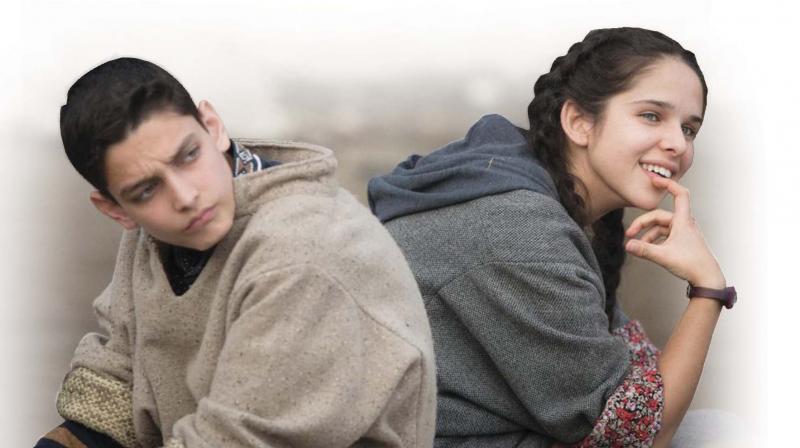No Fathers in Kashmir movie review: Hope and longing in the Valley!
Kumar tells his story through a coming-of-age story between two teens.

Cast: Zara Webb, Shivam Raina, Soni Razdan, Kulbhushan Kharbanda
Director: Ashvin Kumar
Many of us in India know the now beleaguered state of Kashmir through the lens of filmmakers, some of whom may have either a myopic or a biased view of the devastated region. While there may be different viewpoints emerging from writers and directors of different sensibilities, what, perhaps, runs through them all, is the gradual eroding of values that leads to lurking fear, results in the blank faces of men and women waiting for their sons, fathers and brothers to return and an overall disquiet that portends more fright and apprehension. The shrieks and killings and the despair that follows are a total contrast to the picturesque region of Kashmir that remains calm and unaffected, leaving us with a greater sense of disbelief and defencelessness.
After two controversial documentary films, Inshallah Football (2009) and Inshallah, Kashmir (2012), both of which were delayed by the censors, Ashvin Kumar has managed to release No Fathers in Kashmir last week. This time again, he couldn’t escape the brutal axe of the CBFC which insisted on arbitrarily snipping some crucial scenes without any rhyme or reason.
But do we care, really? A film that dares to tell a fictional story set in the Valley has its heart in the right place, and does focus on the issues that have plagued the people of the Valley for so long, will resonate with all those who matter, come what may.
Kumar tells his story through a coming-of-age story between two teens — Noor (Zara Webb) and Majid (Shivam Raina) — in an atmosphere of all-pervading gloom where even any semblance of hope becomes everyone’s supreme aim.
When the 16-year-old British girl Noor visits her grandparents Halima and Abdul Rashid (Soni Razdan and Kulbhushan Kharbanda) in India as the smartphone-wielding, thinking teenager, little does she know what fate she would meet in the village located on the India-Pak border. Noor’s father, like many others, is missing, and her mother Zainab (Natasha Mago) decides to move on; and is all set to remarry IFS Wahid Mirza (Sushil Dihiya); and seeks release and deliverance from her past by getting a paper signed by her in-laws (Noor’s grandparents) to prove that her husband is not just “missing”, but is indeed “dead”. Noor, on the other hand, gets drawn into the mystery that surrounds the disappearance of her father and several others. In the process, an unlikely bonding develops between Noor and Majid, who is more than a willing partner in her quest, and even harbours a secret crush on her as he guides Noor to a forbidden area in an area fraught with danger. While on the hunt for the truth, she discovers that her dad and Majid’s father as well as a local leader Arshid (Ashwin Kumar) were close friends. Her curiosity leads to many realities stumbling out of the closet. She also learns several other hidden truths that she ought not to have known: Her father was picked up by the Indian Army; his closest friend Arshid was responsible for it, and lastly, her father is no more alive.
With anxiety, hope and unspoken distress and dread writ large on their faces, the local Kashmiris look mostly shaken, with precious little hope as they are shown waiting endlessly for the return of their loved ones gone “missing”. Kumar tries to put together a strife-torn state and its inability to deal with a growing menace of a deadlocked situation with a glimmer of sunshine through the eyes of a young boy and a girl. In trying to expose the vulnerability of the people, or the atrocities committed by the men in uniform, it leaves us with more questions that none would have answers to. But alongside the grave impasse with only a view of a bleak future in sight, he also seems to tide over some other glaring errors. Some characters and their portrayals, for instance, are either too stereotypical (Anshuman Jha as a police officer) or too obviously symbolic of a point of view (Kumar as Arshid) that he wants us to be reminded of — that it is always an enemy within us who betrays, and causes our downfall. Where it also falters is its trying to give us a spin-off that seems unwise and simple. The basic premise is also too contrived to let all those who are genuinely concerned about the ongoing suffering.
The performances are all fine — Zara Webb, Razdan, Kharbanda, Jha and Natasha Mago in small but important roles — but why did Kumar have to cast himself in such a crucial role?
Just after the film’s release, Kumar has released deleted footage on the social media. Go watch the film and the censored scenes to judge for yourself!

